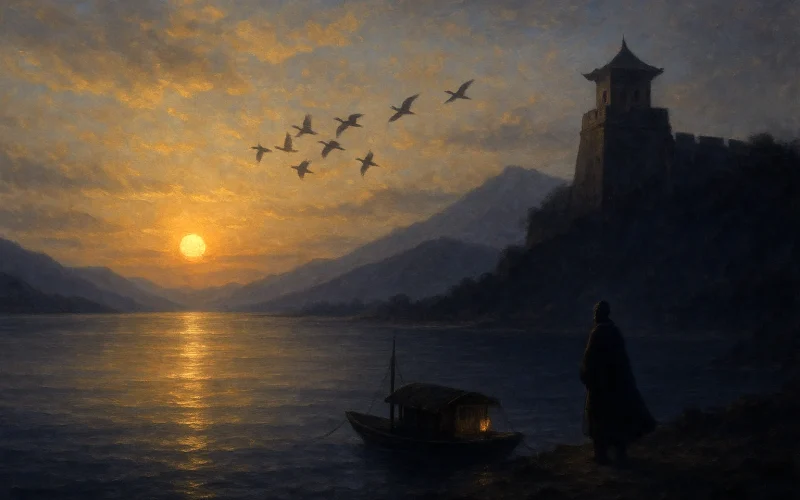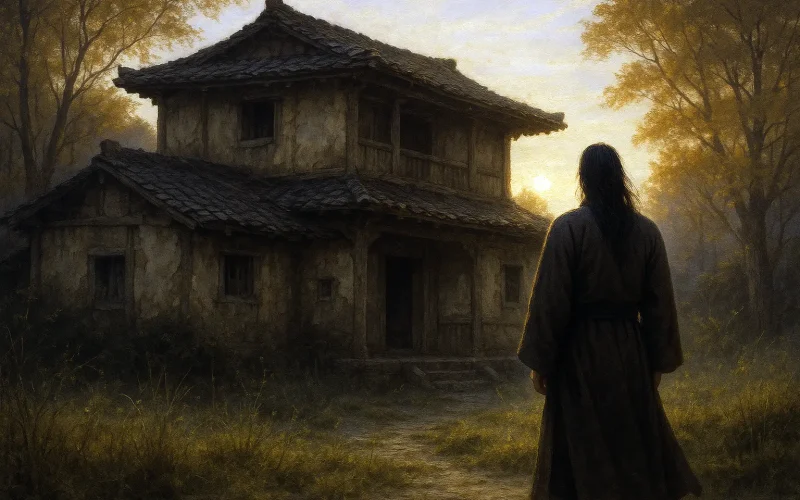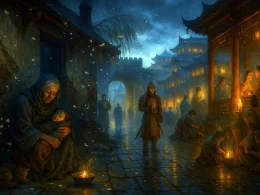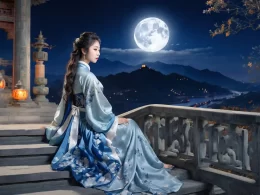No ripples in the river, no mist on the islands,
Yet the landscape is blurred toward my friend in Chu...
Birds in the slanting sun cross Hankou,
And the autumn sky mingles with Lake Dongting.
...From a bleak mountain wall the cold tone of a bugle
Reminds me, moored by a ruined fort,
That Jia Yi's loyal plea to the House of Han
Banned him to Changsha, to be an exile.
Original Poem
「自夏口至鹦鹉洲夕望岳阳寄源中丞」
刘长卿
汀洲无浪复无烟, 楚客相思益渺然。
汉口夕阳斜渡鸟, 洞庭秋水远连天。
孤城背岭寒吹角, 独戍临江夜泊船。
贾谊上书忧汉室, 长沙谪去古今怜。
Interpretation
This poem was composed during Liu Changqing's exile to the Langzhou and Changsha regions, sharing thematic continuity with his other work "Passing by Jia Yi's Residence in Changsha." Through travel observations and lyrical landscape depiction, it conveys the solitude and existential resignation of banishment, using Jia Yi's historical exile as a metaphor for his own grievances.
First Couplet: "汀洲无浪复无烟,楚客相思益渺然。"
Tīng zhōu wú làng fù wú yān, Chǔ kè xiāngsī yì miǎorán.
Sandbars without waves or mist's trace / The Chu exile's longing finds no place
The opening presents an eerily still waterscape where absence ("without…or") amplifies solitude. "Chu exile" (楚客) doubly references both the poet's displacement and the region's historical association with banished statesmen like Qu Yuan, making personal grief timeless.
Second Couplet: "汉口夕阳斜渡鸟,洞庭秋水远连天。"
Hànkǒu xīyáng xié dù niǎo, Dòngtíng qiūshuǐ yuǎn lián tiān.
At Hankou, sunset birds cross askew / Dongting's autumn waters merge with heaven's hue
Expanding the visual field, the skewed flight path of twilight birds mirrors the poet's disrupted life course, while the lake's vast horizontality (water merging with sky) symbolizes both infinite sorrow and the cosmic indifference to human suffering.
Third Couplet: "孤城背岭寒吹角,独戍临江夜泊船。"
Gū chéng bèi lǐng hán chuī jiǎo, dú shù lín jiāng yè pō chuán.
Lone city beneath ridges hears cold horns sound / Solitary outpost by river moors boats nightbound
The auditory intrusion of military horns heightens the scene's desolation, transforming natural stillness into existential chill. The "solitary outpost" becomes the poet's metaphorical self—a watchman of his own stranded existence.
Fourth Couplet: "贾谊上书忧汉室,长沙谪去古今怜。"
Jiǎ Yì shàngshū yōu Hàn shì, Chángshā zhé qù gǔjīn lián.
Jia Yi's memorials showed Han's decline / His Changsha exile stays grief's timeless sign
The historical analogy crystallizes the poem's central paradox: political loyalty begets punishment. "Timeless sign" (古今怜) universalizes the poet's plight, connecting Tang bureaucratic injustice to Han precedents in an endless cycle of intellectual martyrdom.
Holistic Appreciation
The poem progresses through spatial and temporal dimensions: from static sandbars (I) to expansive lake vistas (II), then to militarized nightscapes (III), culminating in historical reflection (IV). This movement enacts the exile's psychological journey—from immediate sensory experience to metaphysical contemplation. The recurrent water imagery (sandbars, lake, river) becomes a medium carrying both the poet's physical journey and flowing sorrow across eras.
Artistic Merits
- Absence as Presence: "Without waves or mist" makes emptiness palpable
- Perspectival Mastery: Zooms from micro (sandbar) to macro (lake-sky) to human-scale (outpost)
- Historical Resonance: Jia Yi's fate becomes prism refracting contemporary injustice
- Sonic Texture: Contrasts visual stillness with horn blasts' aural violence
Insights
Liu's poem articulates the perennial dilemma of principled intellectuals under authoritarian systems—how loyalty to truth invites persecution. His identification with Jia Yi (201-169 BCE) reveals how Chinese literati constructed intergenerational solidarity among history's "losers." For modern readers, this resonates with global experiences of dissident thinkers, while the landscape imagery offers a model for expressing political trauma through natural metaphors rather than direct protest. The work ultimately suggests that historical consciousness provides both wound and salve—intensifying awareness of injustice while offering the consolation of shared suffering across centuries.
Poem translator
Kiang Kanghu
About the poet
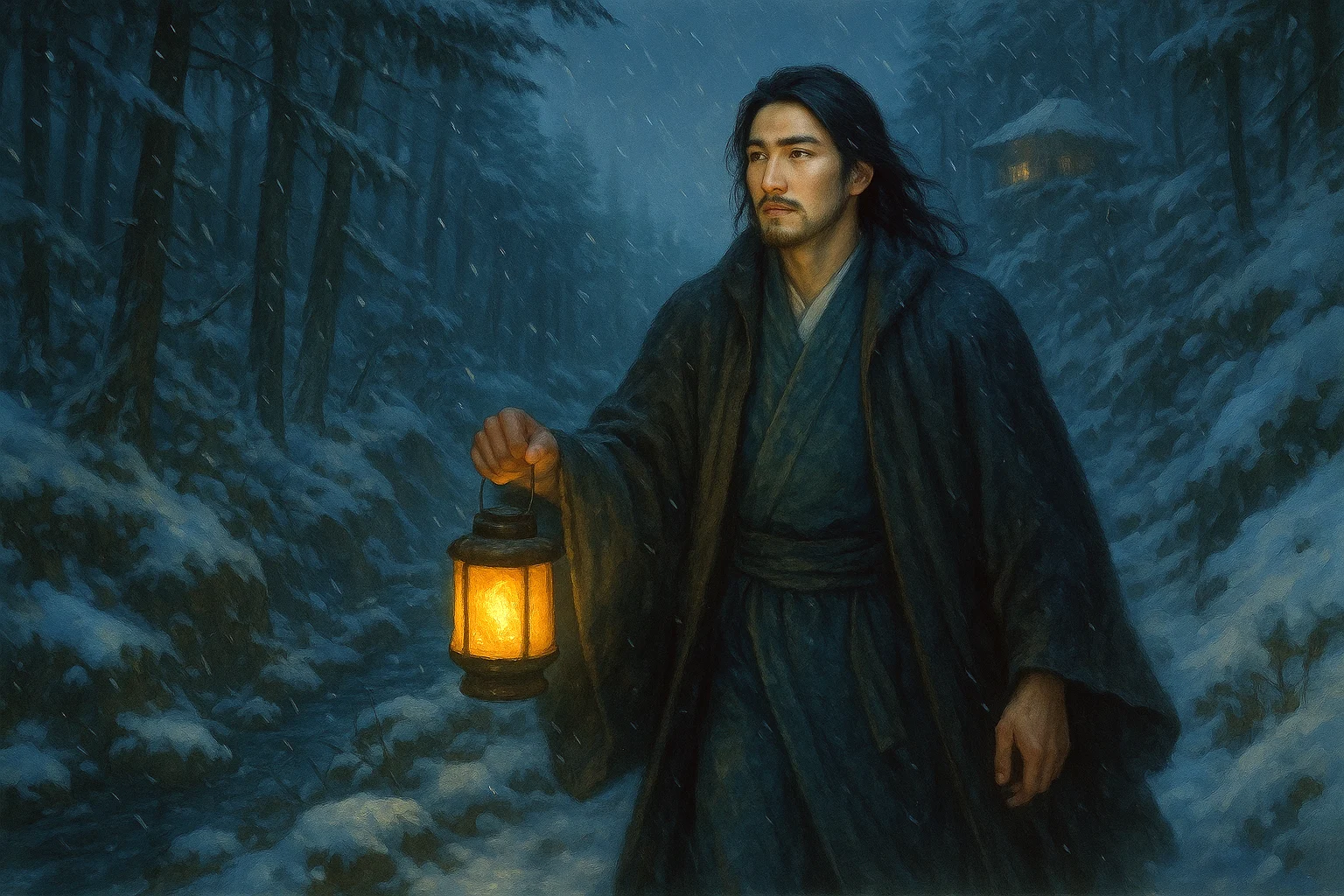
Liu Zhangqing (刘长卿) was a native of Xian County, Hebei Province. He studied at Mt. Songshan when he was young, and later moved to Jiangxi, where he received his bachelor's degree in 733 A.D. He also belonged to the Wang and Meng school of poetry. His poems belonged to the school of Wang and Meng, and he was most famous for his five-character poems, and was also most conceited, once thinking that he was "the Great Wall of five-character poems", which meant that no one could surpass him.






